Amid the around-the-clock flurry of political coverage churning out outrage and indignation at every turn, you’d be forgiven for missing the particulars about the current tax reform proposal being crafted by U.S. House Republicans.
One component of this proposal is the Border Adjustment Tax (BAT), which would drop the corporate tax rate from 35 percent to 20 percent. A major sticking point under this proposal is that companies would no longer be able to deduct the cost of imported goods when calculating taxable income. This would lead to a huge jump in taxes for companies bringing in imports.
The rationale, according to proponents of the proposal, is that the move would allow U.S. businesses to be more competitive by encouraging U.S. manufacturing and preventing the market from becoming saturated with lower-cost foreign goods. The move is also being touted as a way to potentially strengthen the U.S. dollar, which in turn would make it cheaper to import goods. While attractive in theory, the tax regulation would have earth-shaking implications on the auto care industry if implemented, according to critics.
That’s because every auto part and tool produced outside the U.S., in addition to the raw goods and materials imported by U.S. manufacturers, would be subject to the regulation. The result would be higher costs throughout the supply chain that would ultimately trickle down to consumers at the checkout counter.
The proposal has drawn sharp criticism from industry advocates concerned about its potential impact: “The Border Adjustment Tax is an immediate threat to economic viability of thousands of small, family-owned businesses in the auto care industry,” said Bill Hanvey, president and CEO of the Auto Care Association. “We have a complex supply chain throughout the country that distributes the right auto part to the right place at the right time, so that the American consumer can keep their vehicle on the road. The effect of the BAT will rapidly be felt by the consumer, and will bring real, downward pressure on growth, planning and employment in the industry.”
Hanvey, citing data from the Auto Care Association’s analysis of the proposed tax, later issued a warning to lawmakers that the BAT would translate to a $160 increase in annual auto repair and maintenance costs for the average vehicle owner — bringing total auto repair costs up to roughly $1,100 per year.
“This is also a highly regressive tax that will hit working families the hardest because they tend to drive older vehicles that require more repair work and maintenance,” Hanvey said. “The BAT will hurt middle-class consumers and have a chilling effect on small businesses that conduct auto repair work and serve as a source of good-paying jobs in every community in the country. The Auto Care Association strongly urges Congress and the Trump Administration to reject this ill-conceived tax increase.”
The Motor Vehicle Component Manufacturers Trade Association (MEMA) echoed similar concern in a recent press release: “While MEMA supports tax reform, a border adjustment tax, which is a component of the current U.S. House Republican tax reform proposal, could disrupt the integrated supply chain for many companies and cause a ripple effect throughout the U.S. economy by: 1) increasing costs for vehicle manufacturers, 2) decreasing available capital for new product development, 3) increasing consumer prices, 4) lowering sales, and 5) potentially decreasing manufacturing jobs in America.”
Although it is unknown whether the BAT will gain traction with lawmakers or die in the face of outside pressure, the proposal comes at a time when the auto care industry as a whole is searching for stability.
Between telematics and new fuel-efficiency standards, shifting service intervals and the continued computerization of new vehicles, many of today’s repair professionals are looking to latch onto some semblance of familiarity. But for a move designed to help American businesses regain the competitive balance of years past, it’s the proposal’s future implications that have many demanding a closer look.




